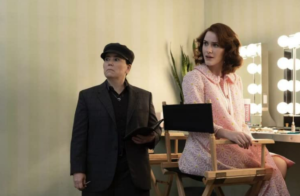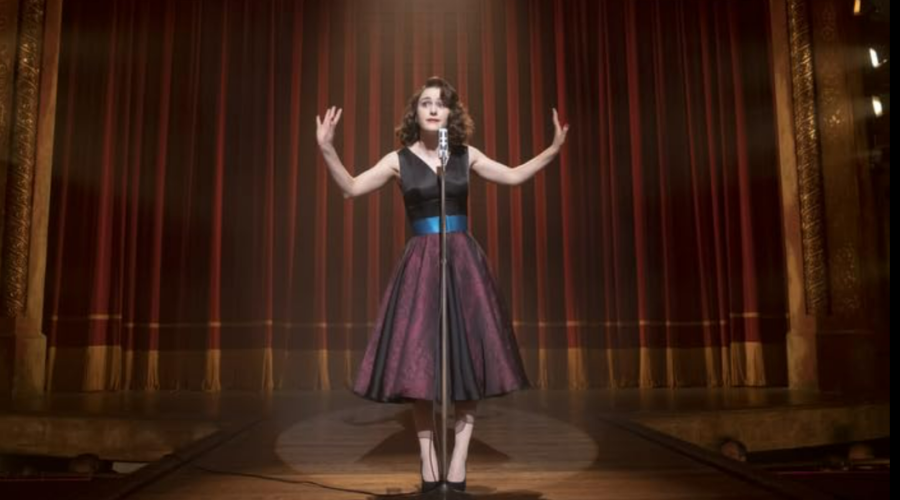This piece contains mild spoilers
Never has a show been so feminist and funny at the same time, proving that the message can be shared in a variety of ways — and in a pretty dress. The impeccable aesthetics, setting, acting and dialogue shone from day one, but they were certainly incredible in the finale when Midge (Rachel Brosnahan) marveled everyone on stage by shooting witty lines that not only made people laugh, but also stirred emotions.
The characters of The Marvelous Mrs. Maisel had outstanding growth, especially in the aspects of women’s role in society – all broadened their perspective. Midge’s final monologues and her dad’s reflection on women really went beyond the screens to create a conversation about it.
Is ambition not attractive in women?
Midge Maisel never hesitated to break the rules, she took the microphone in the first episode without being asked and did the same in the last one, closing the cycle. She refused to follow orders because she knew her power was in her voice and sharp and agile language — with a special gift for observational stand-up.
Throughout the five seasons, female power is evident. The road wasn’t easy, both Midge and Susie (Alex Borstein) paid a high price for dreaming big. Rejection and disappointment were constant but this helped them evolve and change their perspective on life by daring to do more.
In her last act, brilliantly written by creators Amy Sherman-Palladino and Dan Palladino, Midge states, “they say that ambition is an unattractive trait in a woman. Maybe. But you know what’s really unattractive? Waiting around for something to happen, staring out a window thinking the life you should be living is out there somewhere but not being willing to open the door and go get it, even if someone tells you, you can’t.”
A great life in an empty house
Midge and Susie are strong, talented women who know what they want and go for it. Their decisions weren’t always the best, but they learned to surf in a world of predominantly men who weren’t interested in listening.

Susie and Midge are not perfect either, they are complex and very human characters, which is why they connect so well with the audience.
They shared a strong bond and both had a common goal: success. In the last episode, success finally came, with a full schedule of shows, lots of luxury and many people working for them. It was satisfying to see how they achieved, but sad at the same time.
Those last minutes, after the loud applause, showed another reality, loneliness. They ended up alone, in immensely empty houses, after working for decades in the entertainment industry.
But it was not a bitter success, it was satisfying because they both understood that it was worth it to get what they were looking for. After all, as Midge said, “I want a big life. I want to experience everything. I want to break every single rule there is.”
“[The show] doesn’t claim that success will make you happy,” Brosnahan said in an interview. “Or that having it all will fulfill every need you have. But Midge and Susie did what they set out to do.”
“This show about these two strong women. They both get what they want, but they both are very much alone. I think the money Susie got brought her peace,” Borstein added.
A wife off stage?
Midge’s love life was not easy, she knew she would only be seen as a woman and not a comedian if she had a relationship with big names in the industry such as Lenny Bruce (Lucke Kirby) or Gordon Ford (Reid Scott). Plus, the men in her life would always be exposed when she went on stage.
Joel (Michael Zegen) said at the beginning: “I can’t have my wife up there making fun of me on stage. I can’t do it.”
He later changed his mind.
Midge’s great love was Joel, but after the divorce she was careful not to return to the same place. However, the two supported each other through life — he told her during one of their last dialogues together that he didn’t mind being exposed on national television, if she needed to use him as a punch line, he was fine with it. Shortly thereafter he proudly shouted to the entire audience, “That’s my ex-wife.”
For Susie it was different, she closed herself off to romance after losing the only woman she had ever loved. She didn’t seem willing to give herself another chance in that arena, instead she focused on building a great career.
A large Jewish family
Midge’s parents did not serve as support for much of her career, but they were an incredible source of material for her acts. They didn’t understand her work – it wasn’t their fault, they weren’t used to seeing an independent woman.
How could a woman be a comedian in those days? How could a woman get divorced, work, be a single mother?
However, they were not the same after seeing the evolution of their daughter.
The parent-child relationship was presented from different perspectives. Being among the first to seek professional success in her field did not exempt her from making mistakes and her children were the most hurt along the way, as the flashforwards show. But to be fair motherhood doesn’t come with a manual and Midge was also discovering how to be a female comedian.
She admitted it was inevitable that her children would hate her and she wondered about their future conversations with the psychiatrist. However, her work helped her children pursue their own dreams, an opportunity their grandmother or mom didn’t have.
Soul mates are your friends too
The series ended highlighting one of the most important relationships, that of Midge and Susie. After having a difficult fifth season, the old friends look strong and inseparable. They dared to have more, to dream and to raise their voices. They didn’t have it all, but they got what they wanted.
The punchline of the last act was perfect: “Being a coward is only cute in ‘The Wizard of Oz.”

